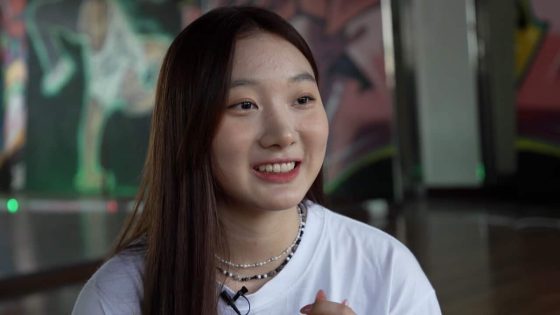This story contains references to suicide.
Watch The K-Pop Dream Factory on Tuesday 27 August at 9.30pm on SBS or
Heesoo Chung has her eyes set on an unlikely goal: becoming a K-pop star.
“My dream is to be an idol star … that’s my only dream,” the 16-year-old said.
The South Korean teenager is one of thousands dedicating their lives to the hope of being idolised by millions.
“I go to an academy every day after I finish school and I practice there from 6pm until 10pm. But I think I need to work harder,” she said.
K-pop wannabes undertake intensive training sessions and find their lives can be restricted to meet the demands of the industry.
“I need to work harder and take even more lessons.”
Chung attends the Hanlim School of Arts in Seoul where students learn 14 different dance genres and take singing classes.
Despite her dedication, she knows making it as a K-pop star will be extremely tough, with less than 1 per cent of K-pop wannabes going on to enjoy industry stardom.
She also knows she’ll have to give up many things — including her freedom — along the way.
The K-pop machine
Since emerging in the 1990s, Korean pop music, or K-pop, has grown into a global phenomenon worth an estimated US$8 billion ($11.8 billion) that attracts hundreds of millions of fans worldwide.
It’s a highly choreographed genre that draws from foreign music styles such as pop, hip-hop, R&B and electronic dance as well as its traditional Korean roots.
Individual groups are known for their distinctive aesthetics and styles, with the most popular singers called idols.
Thousands of teenagers audition every week in the hope of sparking the attention of talent scouts and music labels. And each year, the industry launches hundreds of new idols.
Sarah Keith, senior lecturer in Music and Media at Macquarie University, said the rate of new artists debuting is getting faster and faster.
“That means agencies and artists need to make more of an effort to stand out and excel in what is a very crowded market. The pace and intensity of K-pop doesn’t look like it’s slowing down any time soon,” she said.
‘I had to act like a doll’
K-pop stars are beholden to music labels and managers, losing their personal freedoms in the process.
Designed to embody perfectionism, they’re not permitted to smoke, drink or even have relationships — so they can appear to fans as romantically available.
Earlier this year, K-pop idol Karina from popular girl group aespa was forced to apologise to fans following revelations she was conducting a relationship in secret, which caused fury among fans and threats to boycott the group’s music.
“Music globally, is a place where exploitation happens, where young creative workers are vulnerable. We’ve seen a lot of exploitation, sexual harassment and abuse accusations come out of the US as well,” Keith said.
“The Korean government is interested in preventing exploitation, but this does not mean it wants to stop people training very, very intensively. So there is a whole lot of very, very hard work that can happen even within a legal context.
“As observers from Australia it can be very confronting to us, seeing how much work goes into being a K-pop idol. “
Min Su believes the K-pop fan base creates a powerful culture of impossible expectations.
For Bang Min Su, formerly from K-pop band Teen Top, the scene got too much.
He has now quit the industry, lives above his mother’s cafe and is pursuing a new career in art.
“I thought I’d get to do cool things on stage but in reality … I just had to act like a doll,” he said.
“‘Do this, do that’. Everything was controlled,” he said.
Min Su believes the fanbase is powerful and creates a culture of impossible expectations.
“The fans are the ones responsible for this culture but it’s also the record label’s fault for not stopping it and the artists for not being honest about the impact it has on them,” he said.
“All this contributes to the rotten culture. I think it’s safe to say that most people feel this way.
“Nobody likes having their life controlled.”
Life after K-pop can also be a tough transition when many stars have dedicated their whole life to being an idol.
Min Su said he became an alcoholic, while some of his friends paid an even heavier price.
“Two of my friends took their own lives,” he said.
“They both called me the day before, but I must have been asleep because I did not pick up the phone. And I can’t stop thinking that maybe things would have turned out differently if I’d just picked up the phone.
“This is the dark side of the industry.”
South Korea has the highest suicide rate among the wealthy 38-member Organisation for Economic Co-operation and Development (OECD) countries, with 25.2 deaths per 100,000 people in 2022 . There is an unusually high number of deaths among K-pop idols.
Pushing on despite the risks
Cho Su and Choi Sarang have recently been launched as K-pop stars as part of new girls’ group Candy Shop.
The demands on them don’t seem to have dampened their ambition.
K-pop stars Cho Su and Choi Sarang are part of a new girl group called Candy Shop.
Su has dreamt of being a K-pop idol since she was 15.
“I want to stand on stage and make people happy,” she said.
Her bandmate Sarang is not worried about the restrictions on her freedom.
“This job is not forced. This is what we want … so we have to do it, I think, so it is ok.”
Chung also remains focused on her dream, despite facing countless audition rejections and being told by her teachers to focus on her diet so she can lose five kilos.
“I always fail auditions so much, so that’s making me nervous,” she said.
Hanlim’s PR director Jinny Kim said the school is equipped to provide mental health support to students.
“If the children have any personal problems when they join a record label or if the children have mental health difficulties, then all the teachers at our school can provide them with counselling because they all have that training.”
But Chung said while her arts academy prepared her for the demanding process, it lacks mental health support.
“[It’s] not really [talked about]. So I think I’m learning in myself.”
Readers seeking crisis support can contact Lifeline on 13 11 14, the Suicide Call Back Service on 1300 659 467 and Kids Helpline on 1800 55 1800 (for young people aged up to 25). More information and support with mental health is available at and on 1300 22 4636.
supports people from culturally and linguistically diverse backgrounds.





